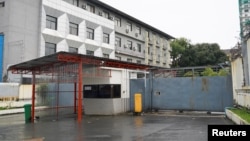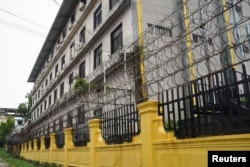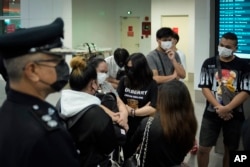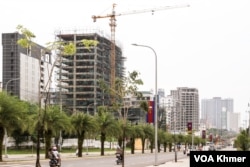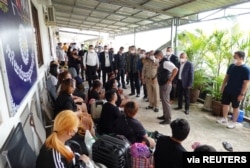More than a year after Cambodia's government crackdown on cyber-slavery scams, anti-human-trafficking groups say scams are still operating at scale, casting doubt on the official narrative that Cambodia has significantly addressed its human trafficking problem.
Cambodia has received widespread attention for its human trafficking epidemic, in which workers are forced to ensnare overseas victims in online fraud schemes. In September 2022, the government raided scam compounds, netting thousands of arrests and deportations.
Since then, Cambodian authorities say they have cut down on human trafficking, disputing a U.N. report that estimated there had been 100,000 victims in Cambodia and accusing news outlets of "baseless" reporting.
International attention, meanwhile, shifted to growing cyber-slavery in northern Myanmar and along the Myanmar-Thai border.
But victim advocate groups say that rather than shutting down, some operations temporarily relocated during the crackdown before reopening in Cambodia. NGOs say identifying and rescuing victims has become more challenging as the government publicly denies the size of the industry.
"From our observation, online scamming has not decreased," Tola Moeun, executive director of the Phnom Penh-based Center for Alliance of Labor and Human Rights, told VOA. "We don't know why there has been no clear action, and we continue to see this happening."
Another international observer working on the issue, who asked for anonymity to maintain relations with the government, told VOA, "It is clear that the volume of trafficking into Cambodia for forced scamming is back to pre-September 2022 levels and maybe exceeding that."
Companies relocated
As police descended upon the notorious trafficking hotspot of Sihanoukville in September 2022, buildings across the city emptied out.
"Michael,” 38, a Taiwanese trafficking victim who was inside Sihanoukville's alleged Huang Le compound, using a pseudonym to talk with VOA by phone from Indonesia, recalled companies scrambling to transfer operations.
"Many companies just relocated at that time," Michael said. "Our company also decided to move."
While some operators went to Myanmar, others remained in Cambodia. Michael was taken to a compound in the town of O'Smach, near the Thai border.
Other Sihanoukville companies operated with skeleton crews, according to the Global Anti-Scam Organization (GASO), which helps release trafficking victims across Southeast Asia.
"Some buildings in Sihanoukville look like empty buildings … but there are indeed human trafficking victims inside," said Alicia, a GASO worker who asked to use only her first name to be able to speak freely. "I can't say that all of them relocated or stopped completely. … Some were still running online scams behind closed doors."
For the next six months, Michael bounced among three more Cambodian compounds. By June 2023, he was sold to Jinshui, a well-known alleged scam center in Sihanoukville's Chinatown area. He began training to impersonate an Amazon affiliate to try to persuade people to invest money.
Already, several Jinshui buildings were occupied with trafficked workers from China, Indonesia, South Korea and Japan, Michael said, while other Chinatown buildings were also filling up.
"One building could accommodate [up to] 800 people," he said. "There were at least 400 to 500 people in our company."
Return to Sihanoukville
Chinatown's repopulation is part of a broader return of scamming to Sihanoukville, observers say.
Jacob Sims, senior technical adviser at anti-trafficking organization International Justice Mission, told VOA a Chinese crackdown on Myanmar compounds and the Operation 1027 offensive against Myanmar's junta have caused a resurgence of scams along the Myanmar-Thai border, in Laos' Golden Triangle, and Cambodia.
"Reports from numerous sources on the ground in Sihanoukville confirm that the industry there is surging," Sims said. "There are real regional drivers for why that trend makes sense. This is a multibillion-dollar industry that has now been effectively displaced from northern Myanmar."
Sihanoukville residents told VOA they have seen a fresh wave of foreigners arriving at compounds straight from the airport. Some previously quiet buildings are now heavily guarded with people living inside.
A compound called "Jincai" appeared abandoned after authorities found evidence of trafficking there in 2022. Since last August, buses have dropped hundreds of foreigners at the property, residents said.
One business owner said her nephew had briefly worked there but quit because "you have to be good at online frauding."
A local policeman told VOA the buildings were filled with Malaysian and Chinese workers, but he did not know what activities occurred inside. The compound is now known as New Golden Wealth Casino Co., which was reissued a casino license in December 2022.
"We don't know if it's new people or the old people who run it," the policeman said.
Chou Bun Eng, Interior Ministry secretary of state and permanent vice chairwoman of the National Committee for Counter Trafficking, would not speak about specific compounds and told VOA that prior investigations did not prevent companies from restarting business activities.
"To allow reopening means that they're among the investigating locations where they could not find anything," Bun Eng said. "It's normal for businesses to continue their work in the case that they do not commit crimes."
NGOs cut out
Even as scamming continues, civil society groups are struggling to help victims.
In several cases, traffickers recorded videos showing "freed" victims outside the compound but brought them back inside after sending the videos to police, GASO's Alicia said. Other victims have been released without help from authorities to travel to Phnom Penh and start the immigration process.
"I don't know if it's because the Cambodian government is not placing as much importance on this issue anymore or what, but I think this way of operating is not appropriate," Alicia told VOA. "It gives scam companies an opportunity to deceive … and can lead to a higher chance of the victim being beaten or hurt."
Cambodia's Interior Ministry set up a hotline for scam victims, which has made the rescue process more opaque, multiple insiders said.
Tola, of the Center for Alliance of Labor and Human Rights, said authorities "cut off the role of the NGOs for help."
"It is very difficult for civil society, and all the work we do must be very cautious," Tola said. "With some of the more controversial cases, we do not dare to say that we help them."
Still, officials tout low official case numbers as evidence the problem has abated. Bun Eng said authorities confirmed fewer than 300 cases of "confinement" since September 2022.
"There is no such mysterious place. We have searched all over the place when there is a complaint, but in the end, there is no huge number," Bun Eng said.
Cindy Dyer, U.S. ambassador-at-large to monitor and combat trafficking in persons, told a local publication that Cambodian officials "disputed the scale" in recent meetings and are "just not getting at the bigger problem."
"There's no way we could see the scale of operation in Cambodia without there being both low-level and high-level complicity," Dyer said. "High-level government officials may be in the front. … The low-level enforcement officers know who owns these things."
Michael, the scamming victim, escaped in July. As his bosses prepared to transfer operations to Myanmar, he contacted the Taiwanese Embassy and GASO, which helped him get away from a van traveling to the border.
Throughout his year in Cambodian compounds, Michael was beaten, isolated in the dark and shocked with an electric baton, he told VOA. He had been recruited on Facebook for a restaurant gig.
"My darkest experiences were in Cambodia," Michael said. "Even if you beat me to death, I will never go to Cambodia again."




